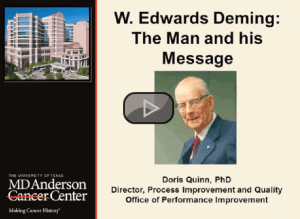
MD Anderson Cancer Center shares a lot of great material online and at conferences. here is an audio presentation (with slides) by Doris Quinn, PhD, Director, Process Improvement and Quality Education titled: W. Edwards Deming: The Man and the Message.
Doris worked with Dr. Deming from 1988 until his death in late 1993. She traveled with him as an assistant and nurse and, in this talk (also given earlier this year at the SHS Conference), she shares a lot of personal stories and insights.
At the start of her talk, Doris says that when she mentions Dr. Deming today, “The youngsters look at me like ‘who?'” but industrial engineers and MBA students have heard of him, generally. I agree with Doris that Dr. Deming's books and work are just as relevant today, almost 20 years after his passing.
Doris recounts a story that confirms what I heard recently from a a friend of mine. At the start of a seminar, Dr. Deming would ask, “Why are we here?” The students would say “to learn statistics” and Dr. Deming would say “To have fun!” Doris adds, “He really did want you to have fun.”
Doris describes Dr. Deming as a kind, humble, giving man. He did not treat the Japanese like a conquered nation. Money he made from selling books there was given back to help rebuild Japan. “He really did love the Japanese people,” she says.
He could be hard on executives, but tended to be more patient with front-line workers. Deming told Doris, “They don't pay me to sugar coat the truth” (to the execs). But, one day was hard on a production worker for not understanding variation. That evening, Deming agonized over that and realized he shouldn't have been hard on her for not understanding… he wrote multiple drafts of an apology letter for before sending it to the woman.
At about 35 minutes in, Doris starts talking more about Deming's teachings around appreciation for a system and profound knowledge. Dr. Deming was a student of psychology and epistemology (how people learn and how they learn from each other). She says Dr. Deming would spend about 20% of this time in workshops on statistics and the rest on “the people side of quality.”
Thanks to Doris and MD Anderson for sharing this material online.
In August, I'm going to be interviewing Clare Crawford-Mason (who Doris mentions in the talk). Clare and I have met before – she worked closely with Deming for many years and Clare will be sharing her memories and reflections, as well. Check out the excellent she and her husband, Bob, produced: The Nun and the Bureaucrat/Good News…How Hospitals Heal Themselves Book/DVD Set
Please scroll down (or click) to post a comment. Connect with me on LinkedIn.
Let’s work together to build a culture of continuous improvement and psychological safety. If you're a leader looking to create lasting change—not just projects—I help organizations:
- Engage people at all levels in sustainable improvement
- Shift from fear of mistakes to learning from them
- Apply Lean thinking in practical, people-centered ways
Interested in coaching or a keynote talk? Let’s start a conversation.








![When Was the Last Time a Leader Around You Admitted They Were Wrong? [Poll]](https://www.leanblog.org/wp-content/uploads/2025/07/Lean-Blog-Post-Cover-Image-2025-07-01T212509.843-100x75.jpg)

Thanks for some more interesting information.
What a great man. His work in Japan was a great contribution.
I loved this: “He could be hard on executives, but tended to be more patient with front-line workers.” Need more of that!
[…] MD Anderson Presentation: W. Edwards Deming: The Man and the Message by Mark Graban – “He could be hard on executives, but tended to be more patient with front-line workers. Deming told Doris, ‘They don’t pay me to sugar coat the truth’ (to the execs). But, one day was hard on a production worker for not understanding variation. That evening, Deming agonized over that and realized he shouldn’t have been hard on her for not understanding… he wrote multiple drafts of an apology letter for before sending it to the woman.” […]
[…] MD Anderson Presentation: W. Edwards Deming: The Man and the Message by Mark Graban – “He could be hard on executives, but tended to be more patient with front-line workers. Deming told Doris, ‘They don’t pay me to sugar coat the truth’ (to the execs). But, one day was hard on a production worker for not understanding variation. That evening, Deming agonized over that and realized he shouldn’t have been hard on her for not understanding… he wrote multiple drafts of an apology letter for before sending it to the woman.” […]
[…] MD Anderson Presentation: W. Edwards Deming: The Man and the Message […]
[…] 2012: MD Anderson Presentation: W. Edwards Deming: The Man and the Message […]